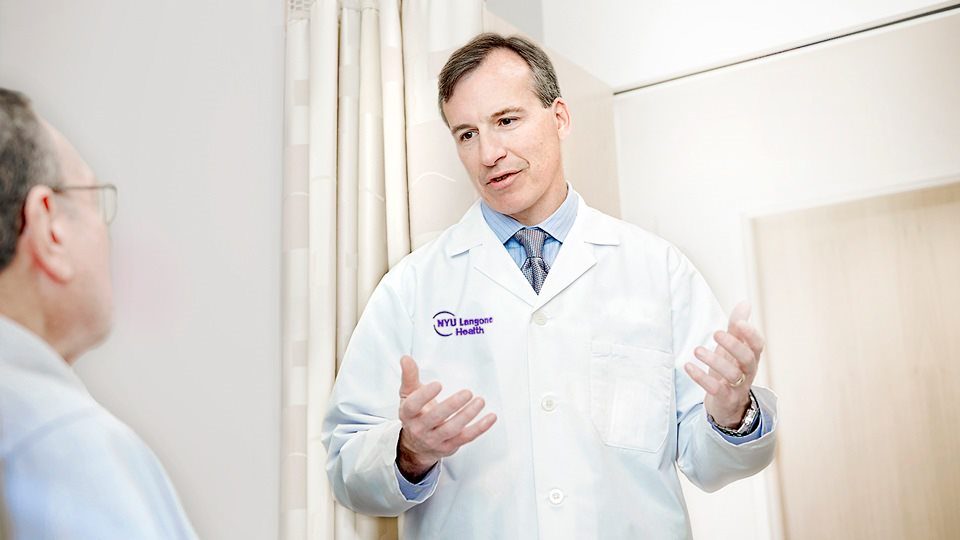Support for Colorectal Cancer
After you’ve completed your treatment, doctors at NYU Langone’s Perlmutter Cancer Center encourage regular checkups to ensure that the colorectal cancer has not returned. Follow-up visits may be as frequent as every three to six months immediately after treatment. Over time, they may taper off to once a year.
During these visits, doctors may perform blood tests that detect levels of carcinoembryonic antigen, or CEA, a protein that is produced in the majority of colorectal cancer tumors. High levels in adults can indicate that colorectal cancer has returned or spread. Your doctor may also use colonoscopy, flexible sigmoidoscopy, and CT scans to view the rectum and colon.

Throughout treatment, our doctors, physical therapists, nurses, nutritionists, palliative care specialists, and psychologists are available to provide you with the support you need.
Physical Rehabilitation
Doctors at NYU Langone’s Rusk Rehabilitation sometimes prescribe physical therapy in the hospital after colorectal surgery, which can help people return home more quickly. Our doctors also prescribe medications for postoperative pain, which may affect mobility.
Rehabilitation Services
Experts at NYU Langone’s Rusk Rehabilitation can help you improve mobility, flexibility, and balance after treatments for colorectal cancer.
Learn MoreAfter an evaluation, Rusk Rehabilitation doctors can prescribe an outpatient rehabilitation program with the goal of optimizing your independence. This program focuses on strength training and aerobic exercise to address tumor-related weakness and fatigue. It also aims to improve balance, flexibility, and mobility.
Management of Side Effects
People who have colorectal cancer may experience side effects, either from the cancer or its treatments. These may include pain, nausea, and fatigue, among others. Our team of experts helps relieve any discomfort or pain you may be experiencing.
Our doctors may prescribe medications, integrative therapies, or both to help you cope with side effects. Integrative approaches may include massage therapy, which can help reduce stress, and acupuncture, which may relieve chemotherapy-related hot flashes and radiation-related fatigue. Doctors may also recommend seeing a nutritionist.
One side effect of chemotherapy may be neuropathy, in which the nerves are damaged, resulting in numbness, tingling, pain, and weakness in the hands, feet, arms, legs, or other parts of the body. Doctors at Rusk Rehabilitation can prescribe medication to ease your discomfort and physical therapy to help you regain your balance and strength.
Stoma Management
Rusk Rehabilitation doctors and nurses can teach you how to care for a stoma, an opening in the abdomen that may have been created during surgery. The stoma connects to an ostomy pouch, a device that sits on the outside of the body to collect waste.
Our healthcare team can help you learn how to manage this pouch, which needs to be changed every few days, and provide you with information on how to maintain your lifestyle.
Nutrition
Perlmutter Cancer Center doctors encourage healthy eating, which is particularly important if your digestive tract has been reconstructed during surgery. You may experience changes in the types of food you are able to tolerate. For example, fatty foods may be more difficult to digest. Registered oncology dietitians at Perlmutter Cancer Center can help you learn how to adapt to your diet.
Nutrition Services
Registered dietitians help create a personalized dietary plan to help your body adjust after treatment for colorectal cancer.
Learn MorePsychological and Social Support
Support groups and one-on-one counseling sessions with a psycho-oncologist, a healthcare provider trained to address the psychological needs of people with colorectal cancer, are available at Perlmutter Cancer Center.
Psychologists are also available to provide support to people who have rare genetic syndromes or other conditions that increase their risk of developing colorectal cancer.
Psychological support can often help you cope with any depression or anxiety you might experience. Social workers are also available to help you address any financial matters that may arise during treatment.
Genetic Counseling Services
We offer a genetic counseling and testing program to help people who are concerned about a family history of colorectal cancer or the possibility of having a genetic syndrome that increases the risk of the condition. Services are also available to other family members who may be at risk.
Meet Our Doctors
Perlmutter Cancer Center specialists provide care and support during treatment.
Browse Doctors